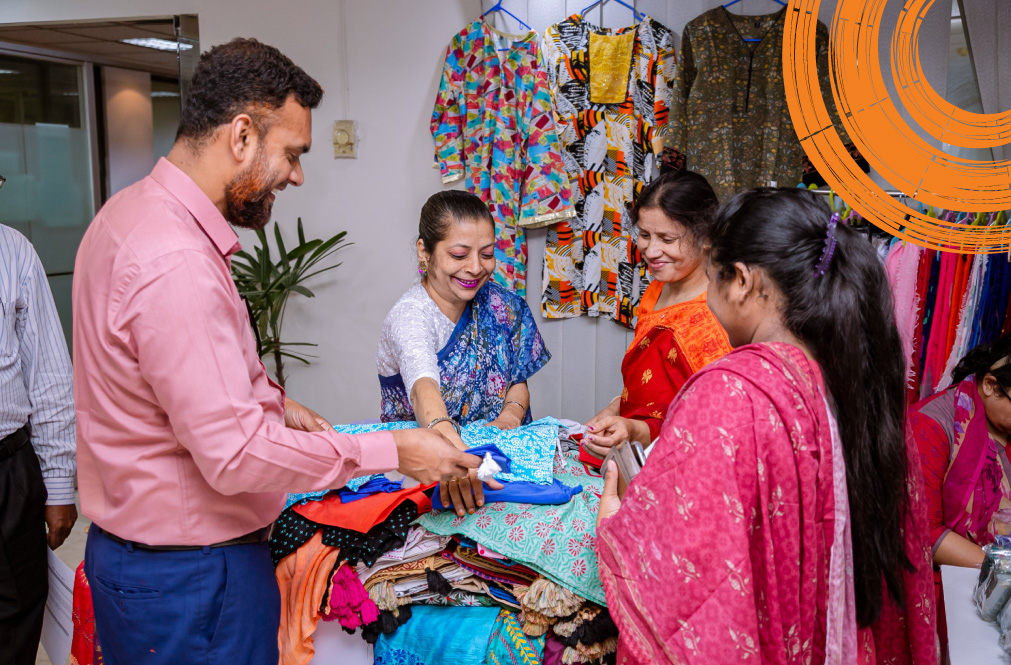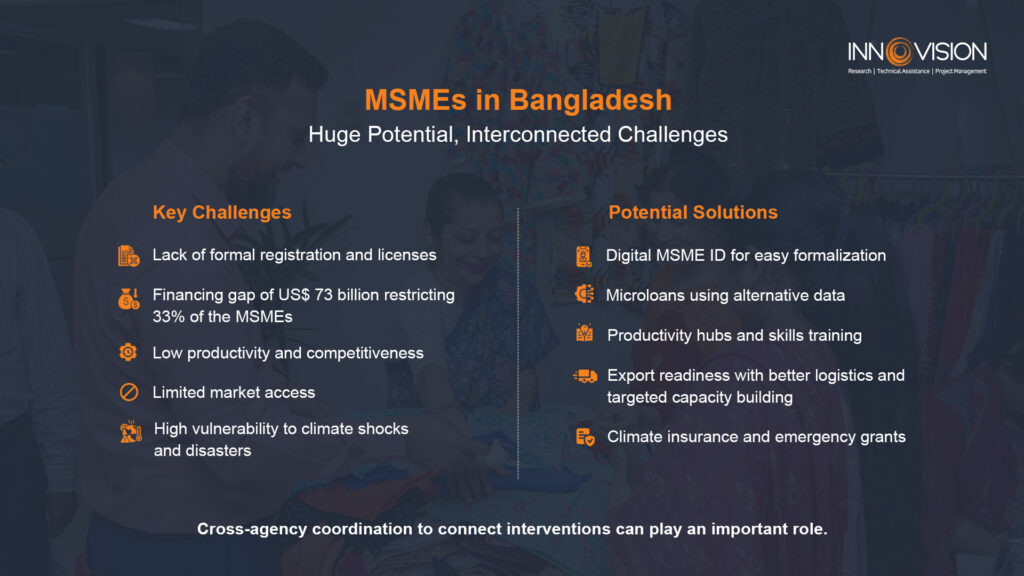
Azizur Rahman Parvez, aged 83, and his sons had run a trusted feed dealership in Mymensingh for over two decades. Their business thrived on relationships: selling to fish farmers on credit and recovering over 90 percent of payments every year. But in 2024, severe floods wiped out most of their clients’ fish stocks. Nearly BDT 4 crore in receivables vanished overnight, and without a safety net, the family business collapsed.
Multiply their story by 11 million. That is the number of micro, small, and medium enterprises (MSMEs) in Bangladesh, according to the Economic Census 2024. These businesses keep the country’s economic engine running yet remain dangerously exposed to shocks.
Globally, MSMEs account for 90 percent of all businesses, employ 60 to 70 percent of the workforce, and contribute around half of global GDP. In Bangladesh, their role is even more critical. The MSMEs range from rural grocery stores and tailoring shops to fish farms and tech startups. They create jobs, offer apprenticeships, and provide income to youth, women, and low-skilled workers. Many are innovation hubs in disguise, meeting local needs with creativity and resilience.
Despite their importance, MSMEs in Bangladesh remain stuck. Informality, lack of access to finance, low productivity, limited market reach, and exposure to climate and economic shocks form a chain that holds them back. One problem reinforces the next, making it difficult to grow or survive. Addressing these issues requires more than isolated solutions. It demands a coordinated, system-level response.
This article explores the most pressing challenges MSMEs face in Bangladesh and outlines practical strategies to help them move forward.

Why Staying Informal Is a Growth Trap and How to Escape It
Experts and policymakers agree that informality is a key barrier holding back MSMEs in Bangladesh. Most SME units operate without business registration or licenses, relying on informal practices that exclude them from commercial banks and financial institutions. Without formal registration or reliable financial records, these businesses remain invisible to banks, government support programs, and legal protections, limiting their ability to access loans, tax incentives, or join structured supply chains.
India’s Udyam Registration Portal (https://udyamregistration.gov.in/) offers a model Bangladesh could follow, having enabled over 24 million MSMEs to register quickly online with minimal paperwork. Introducing a similar tiered digital MSME ID linked to tax and banking systems could simplify formalization and make it more appealing. Instead of penalizing informality, policies could reward formalization through tax breaks, grants, and priority access to government procurement.
The Seventy-three Billion Dollar Finance Gap and How to Bridge It
According to IFC’s MSME Finance Gap Report 2025, Bangladesh faces an MSME financing gap of over US$ 73 billion, equivalent to 28 percent of the national GDP. Women-led MSMEs alone face a financing gap of around US$ 5 billion. Nearly one-third of MSMEs of the country are unable to grow simply because they cannot get a loan. One major reason behind this gap is that banks often require fixed assets as collateral, which many small and informal businesses do not have.
While easing the process of formalization can help, providing instant, small (or micro) loans tailored to the realities of informal businesses can enable them to build a credit history and gradually qualify for larger loans. For instance, the fintech company Branch (https://branch.co/) uses alternative data such as mobile phone usage, social network connections, and transaction history to provide microloans to underserved entrepreneurs who lack traditional credit scores. Bangladesh could develop and adopt similar financial products that leverage alternative data sources like digital payment histories, utility bills, and mobile financial transactions to assess creditworthiness. Expanding existing refinance schemes by Bangladesh Bank can further increase access to finance, helping more businesses grow and thrive.
Overcoming Low Productivity to Make MSMEs Competitive
Low productivity remains a critical constraint for MSMEs in Bangladesh, directly impacting their competitiveness and growth potential. A significant portion of these enterprises rely on outdated machinery and manual production methods, which not only reduce operational efficiency but also limit product quality and the ability to meet market standards. This results in low value-added per worker, constraining income growth and reinvestment capacity. Addressing this challenge requires targeted interventions that reduce capital barriers and enhance access to technology and skills.
For example, Malaysia’s SME Corp (https://smecorp.gov.my/index.php/en/) offers matching grants and soft loans to support machinery upgrades and technology adoption among small businesses. Similarly, South Korea’s SME clusters provide shared access to advanced facilities such as testing laboratories and packaging services, lowering individual costs and promoting quality assurance across small enterprises. For Bangladesh, replicating these models through the establishment of “productivity hubs” in industrial zones could enable MSMEs to pool resources, access modern equipment, and obtain necessary certifications. Furthermore, integrating local technical training centres with these hubs would strengthen workforce capabilities, ensuring that productivity gains translate into improved product quality and market competitiveness.
Breaking the Local Ceiling to Help MSMEs Reach New Markets
In Bangladesh, most MSMEs, particularly those led by women, remain limited to local markets with low margins and a heavy dependence on intermediaries. A 2012 study found that just 1 percent of the 11 trillion US dollars spent annually on global public procurement goes to women-owned businesses, highlighting persistent barriers to broader market participation. Export engagement from Bangladeshi MSMEs is also largely concentrated in a few sectors such as leather, handicrafts, and jute.
The SME Foundation’s Suppliers Platform for Women Entrepreneurs has connected over 1,200 women-owned businesses to corporate buyers. However, its overall impact is still constrained by gaps in logistics, digital marketing capacity, and specialized training. By contrast, Malaysia’s MATRADE eTRADE programme supports MSMEs to enter global e-commerce through subsidies and capacity building, which has helped businesses diversify and grow. Bangladesh can adopt similar integrated strategies that combine digital tools, better logistics support, and targeted capacity building to help MSMEs reach wider markets, increase revenue, and reinvest for sustainable growth.
Protecting MSMEs from Climate Shocks and Disasters
Being the 7th most climate-vulnerable country globally, Bangladesh’s MSMEs in agriculture, fisheries, and informal trade face severe risks from floods, cyclones, and rising temperatures. Studies such as Innovision’s assessment under Swisscontact’s BMMDP project reveal that many MSMEs in coastal Bangladesh, particularly aquaculture farmers, lack insurance or adequate savings, leaving them vulnerable to financial ruin after disasters. For instance, the 2023 floods wiped out 80% of stocks for some farmers, causing losses up to Tk 40 lakh (USD 36,400) per farmer. Only about 100 shrimp farmers are covered by a pilot insurance scheme, while climate disasters caused USD 93 million in losses between 2011 and 2020. This vulnerability not only erases years of effort but also undermines broader economic stability and employment.
In the Philippines, locally tailored micro-insurance products are supporting small businesses in recovering faster after climate shocks. Bangladesh can adapt similar approaches by collaborating with microfinance institutions and insurers to design affordable insurance options and quick-disbursement restart grants linked to digital MSME IDs. Strengthening resilience in this way would help MSMEs protect their assets, maintain operations after shocks, and contribute more consistently to economic growth.
Final Words
Scattered policy interventions have done little to address the systemic challenges facing MSMEs in Bangladesh. What is now needed is a bold and coordinated push to simplify registration, expand financing, increase productivity, open up markets, and strengthen climate resilience.
If policymakers and partners recognize these challenges as part of an interconnected system, MSMEs can thrive. And when they do, they will drive employment, innovation, and inclusive growth across the country.
It is time to stop treating symptoms and start strengthening the entire system.
Notable Sources:
- Bangladesh Bureau of Statistics (BBS). (2024). Economic Census 2024
- Friedrich-Ebert-Stiftung (FES). (2024). Informal SMEs in Bangladesh: Formalisation Challenges and Way Forward
- Jarle Hetland. (2012). Realising the potential of women vendors
- International Finance Corporation (IFC). (2025). MSME Finance Gap Report
- Innovision Consulting (2023). Scoping Study for Assessing the Feasibility and Potential of Microinsurance Service for the Fisheries Sector of Bangladesh
Author: Md Al Imran Rumon, a Portfolio Director at Innovision Consulting.